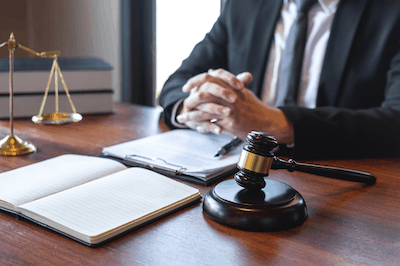
10 Jun What Are Depositions In A Divorce Case?
Everything You Need To Know About Divorce Depositions
A divorce can be a complicated and emotionally draining process. During this process, one party may request a deposition from the other. If you need a deposition, a notice will arrive to inform you. Depositions themselves are valuable tools for gathering evidence for a case, and divorce depositions are similar. These depositions are statements taken under oath by witnesses, although they are recorded outside of the courtroom. The courts will use this information gathered during the deposition as evidence in place of in-court testimonies. Depositions are expected in divorce cases and general family law, so don’t be surprised if you’re asked for one.
A divorce deposition might sound like an intense process to go through, but it can help build your case to reach an ideal settlement. If you’re interested in learning how a divorce deposition works and what to expect with one, keep reading for more information.
When Do Divorce Depositions Occur?
Divorce depositions typically happen during a case’s “discovery phase,” which occurs before anything goes to court. Depositions help to gather vital information from both divorce parties. Usually, a court reporter, attorney, or paralegal will transcribe the testimony during this initial phase of the case. 
Where Do Divorce Depositions Occur?
When you receive a disposition notice, it should include details like time and place. However, generally, these depositions will occur in an attorney’s office. Court personnel will be there to conduct the interview and ensure that the deposition is taken under oath. Keep in mind that you are sworn to tell the truth in these depositions, so lying, changing your story later, or misleading through your words can lead to severe consequences later. Telling the truth is vital when it comes to depositions.
What Are Divorce Deposition Used For
As we mentioned, divorce depositions are handy for attorneys to gather vital information concerning your divorce case. This information is collected before any trial to document critical information that’s been given under oath. Attorneys will use this information to gain insights into the two parties’ assets, debts, and much more. These depositions give attorneys more information to work with for a divorce case. This evidence can be used in the courtroom if the case goes to trial. Divorce depositions are an excellent option to help the court uncover the truth and make the best decision. 
What Should You Know About Divorce Depositions?
Divorce depositions are the same as conventional depositions. They can include people outside of the divorce. Depositions exist to gather evidence for cases and consist of family members, friends, neighbors, colleagues, and more. Anyone that has vital information regarding a divorce case may be called in for a deposition. However, extensive depositions are usually only required for highly sensitive cases, such as custody cases or cases that include incredibly high assets.
Remember, it’s essential to be as truthful as you can be during a deposition. Depositions are used as a gathering of evidence. Attorneys will use this information to build cases and establish witnesses’ credibility. If you lie, you could face a severe fine or other consequences. Depositions are essential when it comes to building a case. They provide information as well as an opportunity for witnesses to tell their side of the story.
Questions You Might Be Asked During a Divorce Deposition
Before you go into a deposition, you may feel nervous or unprepared to answer the questions you’ll be asked. That’s why we’ve prepared a list of topics that may come up during your divorce deposition.
- Money
Money is often a central point of contention in divorces. Income, assets like land or vehicles, and even potential income can affect a divorce settlement. Ensuring that your financial information is recorded and accurate can help this portion of the deposition go smoothly. A deposition can help attorneys get to the bottom of your divorce settlement, from debt to portioning out assets. Don’t worry about financial questions, but be sure to be prepared with as much information as you can.
- Family
Family can be called to dispositions to give testimonies concerning a divorce case. However, usually, the involvement of families is when the case involves children and their custody. Establishing custody and visitation will be one of the main concerns of the divorce case, and you may be asked questions detailed questions about your life. For example, they may want to know your schedule with your kids and if you will be able to take care of them properly considering your work and other schedules. It may be necessary to change your plan from what it was before the divorce. The important thing is that any children are taken care of correctly and that the schedules and custody benefit them. 
- Health
Some questions may be concerning your health, both physical and mental. There may be questions during the deposition concerning your ability to make clear judgments. Caring for children may come into play when considering your health concerns and custody rights. Be prepared to answer questions concerning any health problems you may have struggled with in the past or currently.
- Recreations
Questions also may come up during a deposition concerning your use of recreational substances. From alcohol to drugs, be ready to answer any questions concerning recreations that could harm children or your spouse. On the flip side, also be prepared to answer any questions concerning your spouse’s relationship with recreational substances and how it has affected your personal life or the lives of your children.
- Dates
If questions come up about specific dates during a divorce deposition, then it’s very likely that the divorce is due to an event or circumstance. Be sure to share any pivotal information concerning any event that lead you to this point. You want to ensure that attorneys have the whole story to make their cases concerning your divorce.
Our Tips On Preparing for a Divorce Deposition
Divorce depositions, like any deposition, will require some preparation on your part. You want to ensure that you have your complete and truthful story ready to share. Before you go into a deposition, be sure to talk to your attorney. You’ll want to speak to your divorce attorney directly to ensure they know everything you’ll be sharing in the deposition. You’ll also want to prepare your attorney for their testimony with the other party, helping look them into critical information so your attorney knows the best questions to ask them. Be sure to talk to your attorney about any potential safety risks if you’re worried.
Stick To The Facts
As we’ve mentioned before, you will be held legally responsible for your words. Be sure to state the facts of your story and be as truthful as you possibly can. Listen CAREFULLY to the questions, and ask for clarification if you aren’t sure what the question is or feel that the question could be manipulative. Don’t be scared to admit you aren’t sure about a question. It’s better to be honest than answer every question during a divorce deposition. If someone were to give false information during a deposition, they could face perjury charges, which is a criminal charge. That will undoubtedly hurt your credibility to the court and your case’s overall credibility. Take time to talk to your attorney about what to expect at your deposition. While these tips are helpful, your attorney will have a much better understanding of your specific case. Your attorney will be available to help you during this complex process.
Understand Your Role vs. Your Attorneys Role
When you’re talking to your attorney, ask them about their role in your case and your deposition. While usually, they can’t do much in a deposition, you should still have an understanding of what their place is there. Be sure to have a thorough understanding of their role in your deposition so you can move forward confidently. 
Preparation Is Key
We get it- depositions can be stressful. It’s an official environment, and the questions can be complex. Preparing well can help you feel assured that you have the answers or know when to say that you don’t have them. It can be awkward, too, due to the nature of a divorce deposition. Practice what you’re going to say and how you’re going to tell it beforehand so that you can come into the meeting calm and collected. When you’re there, remember to breathe and to depend upon your preparation. Keep in mind your body language and try to keep it relaxed and open, arms loosely held at your sides and back straight. Remember that depositions will hopefully be to your benefit and help build your case.
Keep in mind that depositions don’t have to be awful with the proper preparation from you and your attorney. It can be a simple meeting when you get to answer questions and tell your story. There will usually be a time between a deposition and a trial for you and your attorney to work on your case. You must work with a licensed and qualified divorce attorney to help you during this settlement process. We hope this article was helpful for you! You can check out more about depositions here.





